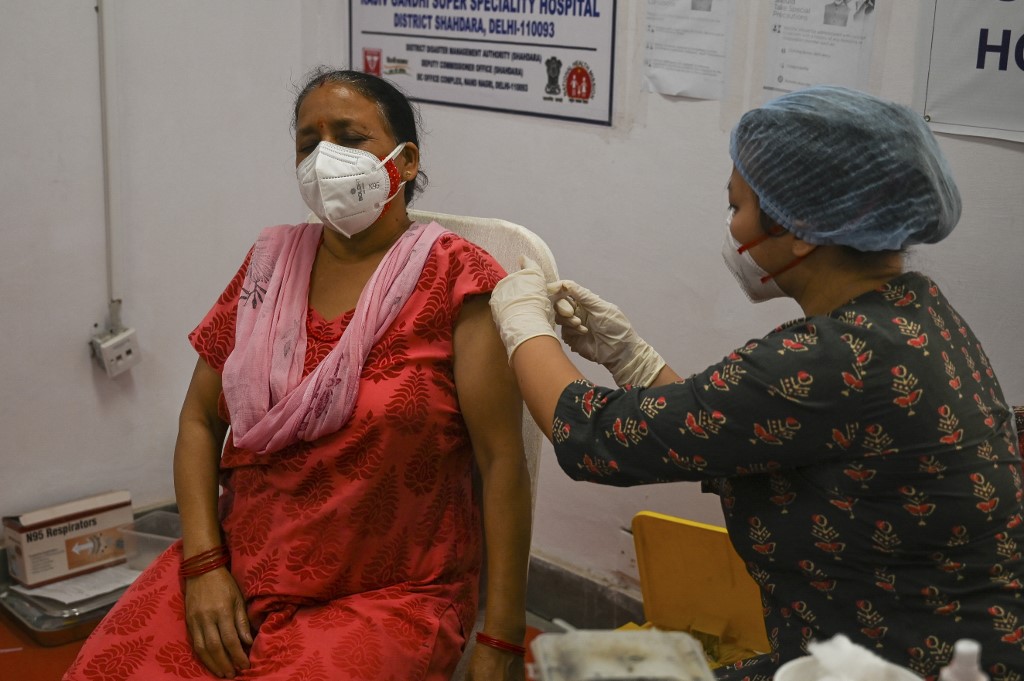Shortages, confusion in India’s vaccination drive

A medical worker inoculates a woman with a dose of the Covishield Covid-19 coronavirus vaccine at Rajiv Gandhi Super Speciality ahospital in New Delhi on April 29, 2021. (Photo by Prakash SINGH / AFP)
NEW DELHI, India — India’s mammoth push to beat its raging COVID-19 surge with vaccinations looks troubled, with its vast inoculation program plagued by shortages, confusion, and political squabbles.
From Saturday, just as the country reels from a brutal explosion of cases, an estimated 500-600 million Indians will become eligible when the drive is opened to all adults.
Until now, only “frontline” workers like medical staff, people over 45 and those with existing illnesses have been given the AstraZeneca shot or Bharat Biotech’s homegrown Covaxin.
But even this more modest programme has faltered, with some areas running out of shots and others throwing them away because of a lack of demand, in part due to hesitancy.
“The queues here are so colossal,” said Jayanti Vasant as he waited at a busy vaccination centre in Bangalore. “The people are just fighting amongst themselves.”
Article continues after this advertisementStocks
So far around 150 million shots have been administered, equating to 11.5 percent of the population of 1.3 billion people. Just 25 million have had two shots.
Article continues after this advertisementAccording to the government, Indian states have stocks of more than 10 million shots and a further eight million will be made available in the coming days.
The Serum Institute is making 60-70 million AstraZeneca doses per month, and is aiming for 100 million by July. Bharat is aiming to produce 10 million a month and targets 60-70 million.
Indian firms also have deals to produce other shots including Russia’s Sputnik V — some of which should arrive soon — Johnson & Johnson’s single-dose vaccine and Novomax.
But it could be months until these are deployed.
“Do you want to control the epidemic, save lives or both? If you want both you’ll require a huge amount of vaccines. And we don’t have it.” said T Jacob John, a retired clinical virology professor at the Christian Medical College, Vellore.
Targeted strategy
Several states have said they don’t have enough shots to start vaccinating all over-18s, including Maharashtra and New Delhi, two of the worst-hit areas.
But despite this, and even though people have to register on a government app but there may still be a rush at vaccination centres on Saturday.
On Wednesday, when online registration began, more than 13 million people signed up and users complained of technical glitches.
Further confusion has been created by New Delhi’s decision to ask states and private hospitals to order vaccine supplies on their own, creating a three-tier pricing system that requires them to pay more per dose than the central government.
This has led to squabbles between the central government, run by Prime Minister Narendra Modi’s Bharatiya Janata Party, and states governed by opposition parties.
Anecdotal evidence suggests that some private clinics have been told they won’t receive any vials for months.
Experts say that given the shortages, and its colossal population, India should have a much more targeted vaccination policy than just opening up its programme to everyone over 18.
This could include concentrating vaccinations in hotspots — some 75 percent of cases are in nine out of India’s 36 regions — and higher-risk population groups.
“We will have to use whatever supplies are available in a very careful and judicious way,” agreed Lalit Kant, former head of epidemiology and communicable diseases at the Indian Council of Medical Research.
“Priority areas must be identified by the (central government) and the states using a proper epidemiological picture to decide who needs it first,” Kant told AFP.